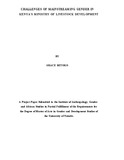| dc.contributor.author | Mitoko, Grace | |
| dc.date.accessioned | 2013-05-10T09:21:32Z | |
| dc.date.available | 2013-05-10T09:21:32Z | |
| dc.date.issued | 2010 | |
| dc.identifier.uri | http://erepository.uonbi.ac.ke:8080/xmlui/handle/123456789/21205 | |
| dc.description.abstract | The Ministry of Livestock Development has adopted gender mainstreaming as a strategy for
advancing gender equality and equity and contribute to the realization of Vision 2030. This
study was thus conducted between October and November 2009 in Nairobi and sought to
investigate the challenges experienced by the policy makers and managers as they implement
gender mainstreaming at different levels in the ministry. The main question therefore was:
What challenges do policy makers and managers experience as they implement gender
mainstreaming in the ministry? The primary objective was to study the challenges of gender
mainstreaming strategies in respect to policy makers and managers in the ministry.
The study adopted a survey design because the researcher intended to collect cross sectional
data on gender mainstreaming challenges in the ministry. The main instrument for data
collection was a structured questionnaire which was administered to employees in the
Ministry of Livestock development targeting 100% of the total population through stratified
random sampling. The Drop-and-Pick later approach was used to collect the questionnaire.
Out of the 60 questionnaires distributed, 42 were filled and returned giving a response rate of
70%. The research questions were systematically generated from the objectives. The data
collected was cleaned, coded and analyzed using SPSS computer package. Descriptive
statistics and qualitative analysis were used to help in drawing comparisons and conclusions
based on the results obtained, interview responses were analyzed qualitatively.
The findings show that some of the challenges faced in gender main streaming include;
gender policy dissemination challenge. About 53% M the respondents agreed that gender
policy exists but the challenge arises during implementation and dissemination of the policy
as responded by 72.2% of the officers. About 90.5% agreed that the policy is not made
available for all staff at all levels in the ministry. About 54% disagreed that affirmative action
is used in recruitment of staff in the ministry, a further 61% disagreed that the contents of
induction program contain aspects of gender mainstreaming. Indeed, the respondents
indicated that mentorship program on gender mainstreaming is not available. Career and
training challenge was also noted where about 66.7% of the respondents noted that no
professional gender mobility exists .in the ministry, with another 47.5% disagreeing that
training opportunities include gender. Finally the working environment challenge was noted
where about 85% agreed that there is a gap between men and women with 88.1% saying that
meetings in the ministry are dominated by men. Lastly, the financial challenge, about 97% of
vi
the respondents agreed that there is no adequate fund for gender mainstreaming; hence it
becomes difficult to streamline gender initiatives.
The second objective sought to determine the strategies of gender mainstreaming in the
Ministry of Livestock Development. Qualitative analysis was used to analyze data gathered
by use of interview guide on policy makers and senior managers in the ministry of Livestock
Development. The challenges can be overcome over time with proper sensitization that
should be continuous till attitude change is attained. This should start with the top
management; however, there is need for political good will. Institutionalization of gender
policy must be fully consultative with a clear definition of the office dealing with gender
issues in the ministry. There is need for commitment by people dealing with gender issues.
In addition the people should be knowledgeable on gender and thus able to engender and
manage budget and other resources. Allocation of adequate budget is an important activity.
Gender should be part of performance contracting and during cascading of the contract there
is need to lobby for money from treasury if gender is to be reflected in the performance
contract. The study observed that there is a disconnect between policy makers and managers
at all levels, the respondents indicated the need to engage senior managers and policy makers
at all levels. The government system is rigid. The ministry should be open to seriously
undertake the new developments while embracing immerging issues.
In conclusion, the study established that a number of challenges are faced in the
mainstreaming of gender in the Ministry of Livestock Development. Although gender policy
statements exist in different policy documents, there is lack of clear frame work and
commitment to main streaming gender in the ministry. The challenges can be solved by
institutionalization of the gender poli~ies, commitment by policy makers and creating a unit
to deal with gender issues as part of their performance contracts and continuous gender
training and sensitization. It requires a national gender policy with clear coordination and
performance metrics on the implementation | en |
| dc.description.sponsorship | The University of Nairobi | en |
| dc.language.iso | en | en |
| dc.subject | Kenya's ministry of livestock development | en |
| dc.subject | Challenges of mainstreaming gender | en |
| dc.title | Challenges of mainstreaming gender in Kenya's ministry of livestock development | en |
| dc.type | Thesis | en |
| local.publisher | Institute of anthropology, gender and African studies | en |

